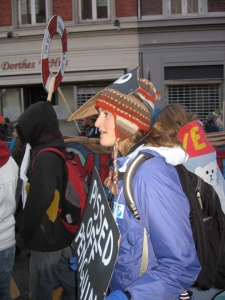by Brooke Welty ’11 and Doreen Stabinsky, COA faculty member
originally published in the Bangor Daily News
Negotiators and ministers from every country in the world are here in Copenhagen trying to form a global agreement to solve the climate crisis. Each of them is asking one question: What will President Barack Obama say when he arrives on Thursday?
We are here too, as part of a 13-student delegation from the College of the Atlantic on Mount Desert Island, and, since it is our president in the spotlight, we’re asking that same question.
The climate crisis is more urgent today than ever before. We have seen delegates here from island states like Tuvalu and the Maldives, and from African nations like Kenya, desperately plead for a treaty that will save their countries from the human suffering that is already taking place due to sea level rise, droughts, floods and crop failure.
For those of you back in Maine who think these problems won’t affect you, think again. Sea level rise due to melting Arctic ice is a grave risk to the northeastern United States. All of coastal Maine is on the front lines for serious flooding if the world fails to contain the climate crisis.
In order to prevent these catastrophes, leaders must leave Copenhagen at the end of the week having crafted a treaty that is fair, ambitious and legally binding. It should ensure that emissions peak in 2015 and decrease as rapidly as possible toward zero after that.
To achieve this, developed nations must commit to cutting their emissions by at least 40 percent by 2020, using 1990 as a baseline. They should create a special funding mechanism to protect tropical forests. And the U.S. and other developed nations should create a fund of at least $140 billion annually to help poorer countries develop renewable energy, end deforestation and adapt to the impacts of climate changes that are already inevitable.
None of this will happen without U.S. leadership. We have contributed more global warming pollution than any other country historically. We drive the world’s economy. Most importantly, we have the capital and human resources to create and export the energy revolution that will repower the world with clean electricity.
Sadly, President Obama has not yet met that call to leadership. He has acted more like a standard politician than as a leader worthy of the Nobel Prize he just won.
The Obama administration has called the carbon reduction targets and financial commitments that the U.S. must make “politically impossible.” Instead, Mr. Obama has offered minuscule pollution reduction targets, meager funds and a push for a mere “political agreement” in Copenhagen that kicks the can further down the road as the planet burns, instead of a legally binding treaty.
To be fair, the president has had to contend with an intransigent Congress, a well-financed fossil fuel industry opposed to action of any kind and a legacy of denial and foot-dragging from the previous administration.
The president’s negotiating team in Copenhagen has tried to remind the media of these obstacles. U.S. lead negotiator Todd Stern has consistently laid the blame for U.S. foot-dragging at the door of the administration’s favorite scapegoat — the U.S. Senate — claiming an inability to act without congressional approval.
It’s disingenuous to present the president of the United States as powerless to act. The recent Environmental Protection Agency finding that greenhouse gases are pollutants that endanger human health gives Mr. Obama the ability to regulate carbon emissions, and that is just one example of how he can act without waiting for the Senate.
This type of true leadership may not be politically easy for the president. But they don’t give away Nobel Prizes for easy tasks.
In his inaugural speech, Mr. Obama called for “a recognition on the part of every American that we have duties to ourselves, our nation and the world; duties that we do not grudgingly accept, but rather seize gladly, firm in the knowledge that there is nothing so satisfying to the spirit, so defining of our character than giving our all to a difficult task.”
So far, the president has not “seized gladly” our duties to the world. He has not even grudgingly accepted them.
As Americans, we hope that changes when Mr. Obama arrives in Copenhagen. We do not want to have to look the delegates from Tuvalu in the eye and tell them that inaction by our country sealed the fate of catastrophe in theirs.





